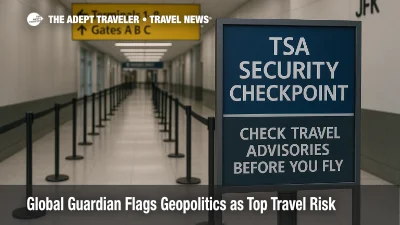Hong Kong, China
When you get a chance to travel to Hong Kong, China, you're really in for quite the sensory bonanza. Imagine stepping into the bustling streets of Hong Kong where skyscrapers kiss the clouds, and street markets brim with vibrant colors and sounds—a fusion of Cantonese chatter, honking trams, and the distant hum of the Star Ferry cutting across Victoria Harbour. The smell of roasted chestnuts and bubbling hot pot infuses the air, an aromatic invitation leading you deeper into the mosaic of experiences this electrifying city offers. And don't even get me started on the food. Dim sum that practically melts in your mouth, cha chaan tengs serving milk tea with perfect sweetness, each sip a comforting yin and yang refreshment, and sautéed beef noodles that are just... sublime. It’s odd that I find myself daydreaming about the eclecticism of Hong Kong, China, a place where traditional temples, with their coiling incense and peaceful nooks, sit snugly alongside neon-lit shopping districts offering the latest in everything. Huh, thinking about it again, there's something wonderfully contradictory about Hong Kong—it’s as if the city can somehow stop time and accelerate it all at once. I guess when you consider the complexities of travel to Hong Kong, it’s almost like deciding to dive headfirst into a whirlwind of culture, style, and sensory overload; there’s a thrilling sort of chaos that becomes strangely comforting the more you immerse yourself in it. Come to think of it, the urge to explore this shimmering metropolis—a patchwork of the serene and the frenetic—is about as contagious as the giggles you might hear from a dai pai dong at the crack of dawn. Alright, maybe that’s a stretch, but hey, it's not too far off! Anyway, if you’re itching to experience the pulsating heartbeat of Asia, travel to Hong Kong, China might just be what the doctor ordered—or at least what your adventurous spirit's been searching for.
Hong Kong, China Travel Season
So, you're thinking about planning some travel to Hong Kong, huh? Honestly, there's not really a bad time, per se, but if you're after that sweet spot where the weather doesn't go to extremes and the crowds don't feel like you're stuck in a cattle drive at the county fair, then you might want to consider a few little insights about the seasons. Now, I'm not saying I have all life's mysteries figured out, but when it comes to Hong Kong, I might have some nuggets of wisdom to share.
First off, peak season. Would you believe it if I said it's the holiday season? From November through February, travelers are like moths to a flame. And I can see why, really. The weather's cool, but not frozen tundra type of cold. Perfect for exploring without being a sweaty mess. Also, Christmas in Hong Kong, China, is kind of mesmerizing with all the lights and events popping up like daisies. But—and it's a big but—it might feel a bit like one of those crowded Black Friday sales if you're not a fan of shoulder-to-shoulder tourism.
Let's take a detour to the idea of visiting during less crowded times. Maybe you've been there too, where you think you're going against the grain only to find everyone else had the same genius idea? My advice: think about March to May. Springtime in Hong Kong is like finding that vintage record you've been eyeing, just serene enough with the weather playing nice, showing off the blooming flowers and greener sceneries. And then there's September and October, where the leftover heat from summer starts to chill out without the bargain-hunting crowds. Both of these times can give you breathing room, figuratively and quite literally.
Oh, and speaking of summer, let's not dance around it. June to August can be, well, a hot mess. Humidity and heat tag team against your sanity, and typhoons might just show up uninvited. But hey, if you're the adventurous type or just love to save a buck, flights and accommodations might be cheaper. Opportunities come in strange packages, don't they?
Then there’s the part where local events add their own flavor to the travel experience. Come to think of it, festivals like the Dragon Boat Festival (around May or June) or the Mid-Autumn Festival (usually September) can be a cultural feast for the senses. Lots to see, lots to do, lots of mooncakes to eat. But mid-autumn can be packed with locals, too, celebrating the festive mood with their families.
The trick, like threading a needle while riding a unicycle, is to balance what you're looking for. Maybe this is just me rambling, but it seems like every choice has its trade-offs. Off-peak times, although less crowded, might mean some attractions are closed or running on reduced hours. Yet there’s a charm to exploring places when they're not polished up for the masses. It’s odd that I think about it this way, as though the travel experience shape-shifts depending on how we approach it.
So yeah, when you decide to travel to Hong Kong, China, you kind of want to weigh these options. Stand elbow to elbow with tourists during peak times, or swerve around the rush for a more peaceful journey? Who knows? Maybe by pondering this a bit, you'll find your own perfect season to discover all that Hong Kong has to offer without feeling like a sardine in a can. And if my thoughts took a left turn here or there, well, sometimes that's just how the brain map unwinds, ain’t it?
The Weather and Seasons in Hong Kong, China
So, when you think about travel to Hong Kong, it's kinda like diving into this vibrant mix of old-world charm and ultra-modern skyscrapers, right? But hold on for a sec—if you’re planning on packing up and taking the trip over to Hong Kong, China, you gotta know what kind of weather to expect. It's something that can really make or break your travel plans. Now, the climate there is something special, almost like it has a split personality throughout the year. Sometimes, it can be as charming as a summer breeze, and at other moments, well... it might just remind you of home but a little more intense.
Let's dig into those seasons for a bit. Spring in Hong Kong, around March to May, is quite the pleasant experience. Temperatures are generally mild, ranging from 65 to 79 degrees Fahrenheit (18 to 26 degrees Celsius) with a moderate amount of rain. It's funny—it’s the time when the city shakes off its winter coat and you start feeling this kind of renewed energy everywhere. The humidity isn't quite full swing yet, so it’s a decent time to visit, I’d say. There's something quite refreshing about Hong Kong during these months, like it's whispering an invitation just for you to explore its bustling streets and serene parks.
Now, summers in Hong Kong, from June through August, are a whole different ballgame. I mean, when the mercury hits 80 to 90 degrees Fahrenheit (27 to 32 degrees Celsius), coupled with high humidity, you better be ready for a sticky scene. It’s a bit like daring to wear a winter jacket in July back in the Midwest, if you catch my drift. There's also a fair bit of rain, with July being the wettest month. If you're okay with braving that, there’s a vibrant energy in the city that’s hard to match during this time. But, if you’re one for cool, breezy days—you might want to reconsider or at least pack some breathable clothes.
And then there’s the fall—September to November—a real sweet spot for travel to Hong Kong, China. The weather starts to chill out a bit to around 70 to 84 degrees Fahrenheit (21 to 29 degrees Celsius), and the air becomes a whole lot less humid. It’s odd, now that I think about it, how calming and clear everything feels during this season. Autumn brings with it a feeling of calm after the summer hustle, and it’s probably one of the best times to visit. The skies clear up, offering some stunning views of the city's skyline. That's when you can comfortably wander around the many outdoor markets without feeling like you just stepped out of a sauna.
Finally, winter rolls in around December through February, and honestly, it’s quite mild compared to the bone-chilling Midwest temperatures I'm used to. We're talking highs of 59 to 66 degrees Fahrenheit (15 to 19 degrees Celsius). Sure, it can get a tad chilly in the evenings, but nothing a good jacket can't handle. And here’s where the seasons pull off a neat trick: there's little rain. Fewer tourists too. It’s like enjoying the city in a more intimate setting.
Of course, when travel to Hong Kong is on your mind, you might wonder about the ideal time to dive into this adventure. If you ask me, the fall perks are unbeatable for those who want a balance of weather conditions. Plus, there's the Mid-Autumn Festival with colorful lanterns and mooncakes—a local event you ought to see at least once. Then again, each season has its own unique flair, and, who knows, whether it's the bustling energy of summer or the laid-back vibe of winter, maybe you'll find the perfect fit for you.
As you're figuring this all out, let your thoughts meander a bit like mine did. It's kind of a journey itself, thinking about when and why to travel to Hong Kong, China. What season calls you? Maybe it's the vibrant chaos, or perhaps the serene calm? Whatever it is, the weather here is more than just a backdrop; it's an active player in the city’s charm.
Accepted Payment Methods and Other Payment Information in Hong Kong, China
Traveling to Hong Kong, China, offers a whirlwind of cultural and financial flavors that's as varied as a Midwestern potluck. The local currency, the Hong Kong Dollar (HKD), is at the forefront of everyday transactions. By and large, the dollar bills here come in all kinds of colors—it's kind of like Monopoly money if you ask me, but the stakes are real. When I think about it, having some cash on hand is still good advice. People like to keep things traditional sometimes, and cash is just about as traditional as it gets. But wait—hold on, because it's not all about cash. Credit cards, especially those fancy global ones, are quite popular.
When you travel to Hong Kong, using Visa and Mastercard is about as common as you might imagine. I mean, these cards have a universal language, right? Then there's the American Express crowd. Just like back home, you gotta keep an eye out because not every place takes AmEx. Still, it’s widely accepted in many hotels and restaurants, which is a relief. Discover? Not so much. It's a bit like trying to find sweet corn on a Hong Kong menu. Possible, maybe, but not very likely. You might want to reconsider relying on that one. It's funny how these quirks pop up, isn't it? From time to time, you stand there, holding your Discover card, and think—whelp, maybe next time.
So now let's meander over to tipping etiquette, which isn't as simple as dropping a few coins like we might do at the diner back home. In Hong Kong, tipping isn't expected in most spots, but you can leave a little something, particularly if you've had one of those meals that just warms your bones. People usually round up the bill a notch or two. It's something travelers to Hong Kong, China sometimes find amusing—and slightly baffling, too. Speaking of meals, thinking about dim sum and noodles is making me hungry. Got a yen for Hong Kong cuisine? You won't be disappointed.
Let's not forget the tech-savvy side of things. Mobile payments are catching on faster than you can say 'howdy,' and it's fascinating to watch. Alipay and WeChat Pay are quite the rage, kind of like those new tech gadgets we'll see on the ol' farm back home one day, I'm sure. But caution—you might want to check if your mobile wallet works overseas. Sometimes, it can be like trying to tune in a radio station that’s just a bit too far out of range. Then again, adaptability is key and being prepared is never a bad thing.
It’s odd that it seems such a big part of travel to Hong Kong, China, is navigating payment choices. I never thought it would be such a talking point, but upon reflecting—it actually makes a lot of sense. Money can shape a big part of our experience, sort of like how sweet and salty make a kettle corn stick in your mind. Keep some cash in your pocket, your cards ready, and a sharp eye on the apps. With all these options, traveling to Hong Kong becomes like a little adventure of its own. And hey, that's all part of the charm, isn't it?
Why You Should Travel to Hong Kong, China
Vibrant Urban Energy
Now, when you travel to Hong Kong, you'll quickly realize it’s got this contagious urban energy that’s hard to resist. It's like stepping into a bustling movie set where every corner is alive with action, people moving fast, streets buzzing like bees. The city runs at breakneck speed, and it feels almost electric—no wonder it draws travelers from every nook and cranny. And, it's not just the big skyscrapers piercing the sky, but the way energy is woven into every alley and open market.
Culinary Delights Await
Of course, no travel to Hong Kong, China would be complete without diving fork-first into its culinary world. This place is a haven for foodies, offering a crazy variety of street food, world-class dining, and everything between. From the iconic dim sum, which practically begs to be shared, to the sweet and savory tastes of cha chaan teng—there’s something about the flavors here that keeps people coming back. And again, you might end up loosin’ yourself in the myriad of tastes and textures the city offers.
Rich Cultural Tapestry
When it comes to culture, Hong Kong stands unmatched. Traced through its intricate temples, festivals, and even its architecture—everywhere you look, there’s a story to be told. Maybe it’s the blend of Eastern traditions and Western influences that creates this unique vibe. Old and new intermingle with such ease, you'll find history tied into its very fabric, much like seeing the familiar become extraordinary.
Shopper's Paradise
So, if I’m honest, Hong Kong is truly a shopper’s utopia. You could argue there's no better place for retail therapy. From street markets like Temple Street Night Market and Ladies Market to high-end malls dripping with luxury, the city offers a dizzying array of options. It’s as if shopping here isn’t just about buying things—it’s an experience, a hunt, a leisurely stroll through styles both bold and understated.
A Skyline Like No Other
Let’s shift our gaze upwards for a moment and talk about that skyline. Famously abundant with skyscrapers, it creates a silhouette that dances both day and night. Victoria Harbour steals the show with an almost theatrical display of light, making for some striking photos. You know, it's kind of funny how you don't really realize how much a skyline can encapsulate a city’s spirit until you see it for yourself.
Blend of Tradition and Innovation
Something that might catch you off guard when you travel to Hong Kong is how it nails the blend of tradition and modernity. You wander into a quiet temple and almost instantly feel a century’s worth of stories whispering through incense smoke, then step outside to see the latest tech innovations blinking through massive screens. And maybe that’s part of the city’s charm—it’s a place comfortable in old shoes, yet eager for innovation.
Stunning Natural Landscapes
Yeah, believe it or not, amid all this urban hustle, Hong Kong, China packs a punch when it comes to natural beauty. Explore the scenic trails like Dragon's Back or Sai Kung, and you will stumble upon breathtaking panoramic views you're not likely to forget. Remember, it's not just skyscrapers here, but also rolling hills and pristine beaches. The balance between natural and man-made is almost poetic when you give it a moment of thought.
Efficient Transport System
Here’s something practical—one of the joys when travelers visit here is how zippy the public transportation is. The MTR and well-oiled bus systems make navigating Hong Kong a breeze. It's striking how seamlessly you can cover the city, roaming from bustling urban centers to quiet coves without breaking a sweat. Convenience is king, after all, and that’s something I suppose we can all appreciate.
Fascinating History
Let’s roll back the clock a tick and touch on Hong Kong's fascinating past. Its history is as colorful as a stained glass window catching the light. Colonization, war, and development have all left their marks, fostering a place where resilience has long been ingrained into its core. Each historical site, such as the captivating stories of Kowloon Walled City or the ancient village of Tai O, offers a peek into a rich tapestry spun over centuries.
Art and Creativity
While at it, let’s not overlook Hong Kong’s burgeoning art scene. When I think about it, the galleries and street art scattered across the city almost feel like open invitations to get lost in creativity. A visit to the Hong Kong Museum of Art or wandering through the vibrant streets of Sheung Wan reveals that art here is thriving. It’s clear—Hong Kong nurtures creativity, cradling it within its urban arms, letting it grow and take form.
The History of Hong Kong, China
Travel to Hong Kong, China and you're diving into a rich tapestry, where modern skyscrapers tower over deeply historical roots. It's a city that's got layers, much like a lasagna my grandma used to make—each strata revealing something new. Now, Hong Kong might be one of those places where its modern identity tends to overshadow its past, but don't be fooled. This place is practically bursting at the seams with history. Sure, it might seem like a city with a more recent history when compared to, say, Rome or Athens, but that's what makes it fascinating in its own right. Imagine a city where the past and present intertwine like an old couple telling stories they've heard a thousand times. That's Hong Kong for you. And hey, just thinking about the fact that it was just a cluster of fishing villages gives me goosebumps.
You've got British colonial rule on one hand, which started clear back in 1842—a classic example of history's long arm. Picture it: An island handed over to Britain as part of the Treaty of Nanking, shaping it into a global port city. It's like all those historical dramas where two worlds collide to make something altogether new and unexpected. Oh, and the landmarks! Victoria Peak, for instance, offers a view that'll nearly knock your socks off, especially when the city's all lit up at night. It's almost like taking a peek through a time machine where you can see changes from past to present. And, you know, if you head over to the older parts like Sheung Wan, it's like a whole other world, a whisper of history against the pulse of modern life.
It's worth it, too, to ponder the cultural amalgamation that is Hong Kong itself. You've got to respect a culture that manages to weave traditional Chinese customs with Western influences so seamlessly. It's like watching an impressive dance; you can never quite figure out how they're doing it, but you'd watch over and over just the same. Every festival, every street market, feels like a pageantry of that blend. And heck, if you're into food like I am, the culinary scene is nothing short of a mouth-watering history lesson. From dim sum to cha chaan teng meals, it's like eating your way through history while standing still. Come to think of it, tasting history is maybe the best way to understand it.
Now, don’t let me get away without mentioning the handover in 1997 when Britain officially returned Hong Kong to China. At the time, there was a fair bit of hullabaloo and uncertainty about what that meant for the city's identity. Yet, Hong Kong has managed to hold on to its uniqueness like a favorite old baseball glove. If anything, this place is a testament to resilience. It's adaptable, a kind of paradox between stability and change, much like the Midwest weather really—seasons may change, but you always know what you're gonna get in time. To travel to Hong Kong, China is to see this whole fascinating balancing act play out, a beautiful mix of tension and harmony that keeps enticing people back, myself included.
The Culture of Hong Kong, China
Traveling to Hong Kong, well, it's like diving headfirst into a world that dances on the tightrope between tradition and modernity. You know, you’ve got these skyscrapers reaching for the clouds, but just down the road, there's an incense-soaked temple that’s stood the test of time. The people here are like a quilt stitched with threads from different worlds, all interwoven into this amazing tapestry. It’s a place where traditional festivals like the Dragon Boat Festival bring out a cacophony of drums and gongs, with rowers slicing through water like a human-powered symphony. You don’t need a ticket to enjoy the spectacle of color and camaraderie, though an umbrella might be handy, the spirit is infectious. It's just one of those experiences that's tough to describe without feeling a little rush of adrenaline.
Speaking of traditions, it's hard to overlook the daily customs that are — well, they’re just a comforting kind of puzzling. Morning rituals often include a stroll through markets that are more vibrant than a Midwest farmer's market in July. You're likely to see elders practicing Tai Chi in the park; it’s rhythmic and almost meditative in its grace. There's a common respect for balance, for harmony, and you might even think about your own hurried mornings back home and wonder if we shouldn’t all just stretch a little more. As you wander through Hong Kong, noticing the juxtaposition of the old and new, you can't help but feel it's these small everyday rituals that keep the city alive.
When it comes to cultural expressions, Hong Kong doesn’t just check a box, it rewrites it. Music here? Well, it ranges from Canto-pop blaring out of neon-lit karaoke bars to the thrill of a traditional opera performance that’s retold in a sort of nostalgic storytelling. Art galleries frequently showcase works that reflect a confusing blend of Eastern aesthetics and Western techniques, a mix that’s worth a pondering pause. Street art? It's thriving, a dizzying showcase of eclectic styles and statements. And dance — imagine a fusion of ballet and contemporary, exploring themes that are very now, yet somehow timeless. I suppose it's hard to wrap your head around how this mix shouldn’t clash, yet it doesn't — it just feels right, almost like sweet and salty popcorn.
But here's the kicker: travel to Hong Kong, China, and you’ll be stepping into a bubbling pot of influences from Britain, immigrants from SE Asia, and of course, its Chinese heart that beats the strongest. English and Cantonese mesh together in conversations, and the local cuisine is a testament to this mix, with dim sum sitting comfortably next to fish and chips. And there’s talk of preserving indigenous cultures, too, with local crafts and dialects being celebrated in festivals and exhibits. Now, it might be a bit odd to someone who's used to one dominant culture — but come to think of it, isn’t that the very flavor that makes Hong Kong dynamic? So, it’s really a city that invites travelers to not just see but to feel, smell, taste, and hear the chorus of its cultural symphony. It’s an experience that sticks with you, a bit like that catchy tune picked up on a lazy afternoon back home.
The Culinary Experience of Hong Kong, China
Travel to Hong Kong, China, is a journey into a vibrant culinary tapestry that's anything but ordinary. In Hong Kong, it's as if each meal is a gateway to not just sustenance, but history and innovation. Picture this: bustling dai pai dongs or street food stalls where the aroma of steaming dim sum and roasted meats wafts through the air, beckoning you closer. It's kind of a grab-and-go food paradise, if you will, where you're as likely to find a grandma folding dumplings as you are a hip youngster savoring that perfect bite. But, come to think of it, isn't that the beauty of travel? You get to taste, hear, and see the everyday life of others embodied in the simplest of things—like a bowl of wonton noodles. The local cuisine here flaunts a melange of influences—Cantonese, British, even Southeast Asian. And getting a bite to eat is like tasting history, or so they say. Pretty neat, right?
Now, if you're gonna travel to Hong Kong, you've got to try some of their iconic dishes. Dim sum is one of those shared experiences that bring folks together. Imagine gathering around a table, steaming bamboo baskets loaded with shumai and har gow, and bridges the gap between breakfast and lunch, a kind of brunch that also shows up for breakfast. And then there’s char siu, that sweet-glazed barbecue pork that glistens like it was hand-painted by a culinary Picasso. Oh, and don't skip out on silky congee or—you know—egg tarts that kinda resemble, well, little sunshine custard pies. And, if I'm honest, you'll want a wide-angle lens on your appetite because a trip to Hong Kong, China, without sampling these dishes is like visiting Chicago without trying deep-dish pizza. It's just... it ain't right.
When you're talking beverages, we're talking something a bit wild and homegrown. Ever hear of snake wine? It's one of those 'TRAVEL TO HONG KONG and just try it’ kind of experiences, capturing the adventurous spirit with potent herbs and snakes (yes, real snakes!). For the less daring, don’t worry, Hong Kong has locally-crafted beers—aptly named Gweilo beers, imagine that—that’ll quench your thirst with a distinctive flair. There’s always something seasonal happening too, like the Dragon Boat Festival with its own heap of special treats. Or, hey, the Mid-Autumn Festival beckons with mooncakes that are more than just food; they're like a cultural postcard, y'know?
Now—just think—how incredible is it that Hong Kong's culinary scene has embraced dietary preferences like vegan or vegetarian options without missing a beat? Not a lot of places can boast of tofu pudding that feels like it could melt in your mouth or faux-meat dishes that could convince even the burliest meat lover to take a second bite. It's something else to see how the city, steeped in tradition, evolves so seamlessly. And isn't that just what makes travel so endlessly fascinating? Whether you're delving into the heart of local legends or a street market, it leaves you—dare I say it—hungry for more. Kinda makes you revaluate how you define home-cooked meals, doesn’t it?
What to See and Do in Hong Kong, China
Traveling to Hong Kong, China, is like stepping into a world where modernity and tradition collide in the most fascinating ways. The skyline, ah, it’s iconic. But if you think it’s all just about towering skyscrapers, well, think again. Picture this: you’re walking along the bustling streets, and suddenly you find yourself surrounded by serene temples and quaint little tea shops. It’s that kind of contrast that makes Hong Kong such an alluring destination. You can feel both the hum of business and the whisper of history all at once. So, what are the must-sees and must-dos when you’re out and about in this vibrant city? Let's start unraveling some of its many layers.
The Symphony of Lights
Every night, Hong Kong puts on one of the world’s largest permanent light and sound shows, the Symphony of Lights. Imagine over 40 skyscrapers synchronized with music and lights, coming alive in a way that makes you remember why cityscapes can be just as stunning as natural vistas. It’s a show that doesn’t just meet expectations—it surpasses them. Grab a spot at the Tsim Sha Tsui Promenade, or better yet, hop on a Victoria Harbour cruise for a front-row seat. Visitors often find themselves mesmerized, pondering the rhythmic pulse of this urban heart.
Victoria Peak Views
Victoria Peak, or simply "The Peak" to locals, offers panoramic views that redefine breathtaking. A tram ride up gives you a thrilling ascent, paired with vistas that make your heart leap. Fancy a moment of introspection amidst travel’s hustle? It’s curious, really, how a concrete jungle can look so tranquil from up here. Whether you're a solo traveler or with family, it’s a place that sparks conversations about the city’s ever-growing skyline.
Exploring Temple Street Night Market
For a taste of local culture, head to Temple Street Night Market. It’s a sensory overload, but in the best way possible, with stalls selling everything from trinkets to street food that fills the air with delicious aromas. Travelers find themselves lost in the flurry, bargaining for souvenirs while contemplating Hong Kong’s vibrant market scene. Here, you’re more than a tourist; you become part of the nightly ritual, witnessing the city come alive through authentic interactions and hidden treasures.
Wonders of Ngong Ping 360
If you’re into adventure and culture, then this one’s for you: Ngong Ping 360. You’ve got to try the cable car ride leading to the Big Buddha and Po Lin Monastery on Lantau Island. The 25-minute journey isn’t just travel; it’s a flight over lush landscapes and peaks that seem to whisper stories of ancient times. Upon arrival, the immense bronze Buddha welcomes you with open arms—it's like Hong Kong’s embrace of both spirituality and majesty. Families and adventurers alike will find something profound in the experience.
Marveling at the Chi Lin Nunnery
Hidden among the skyscrapers of Kowloon is Chi Lin Nunnery, a place that seems to defy the brisk pace of city life. Stepping into its tranquil courtyards, you can’t help but feel a serene detachment from the bustling city. It’s a bizarre contrast when you think about how close this sanctuary is to urban madness. For those who travel for peace more than excitement, it speaks to a quieter side of Hong Kong, China, echoing an era of reflection and simplicity. Take this as a gentle reminder of life's subtle balances.
Dim Sum Dining in Kowloon
No travel to Hong Kong would be complete without delving into its culinary delights, especially dim sum. And Kowloon is the place to be for this culinary adventure. Little bamboo baskets reveal bite-sized treasures that are as pleasing to the eye as they are to the palate. Tea houses buzz with conversation, clinking cups, and the constant lanuga of tasty bites, making it an immersive experience whether you're new to it or a seasoned dim sum enthusiast. Eating, here, becomes an exploration and a testament to why Hong Kong is a gourmand's dream.
Instagrammable Tai O Fishing Village
For a glimpse into traditional Hong Kong life, a visit to Tai O Fishing Village is a must. It feels like stepping back in time, where stilt houses line the waterways and local fisherfolk go about their daily rituals. It’s these candid snapshots of a simpler life that have a magnetic pull on the Instagram generation. The quiet charm of Tai O provides a refreshing pause away from city life while offering some pretty stellar photo ops. Who knew tranquility and authenticity could be so, well, picturesque?
Hiking the Dragon’s Back
Adventure seekers, it’s time to lace up those hiking boots for the Dragon’s Back trail. It’s often hailed as one of Hong Kong’s best hikes, serving up glorious views of seas, bays, and ridges. As your feet connect with nature, amidst all that lush greenery, you might find yourself pondering city life, balancing it all, or just soaking in the peace of nature’s embrace. It’s one of those experiences where the journey itself becomes as freeing as any destination might be.
Cultural Dive at PMQ
If you’re curious about Hong Kong’s creative pulse, a visit to PMQ, formerly the Police Married Quarters, is in order. Now a creative hub, it’s brimming with artists, designers, and exhibitions that paint a vivid picture of Hong Kong’s burgeoning art scene. Strolling through its corridors, you feel that palpable energy from youthful innovation to artistic homage. It's interesting how old architecture and new creativity come together, blending into a space where imagination runs wild. Truly, it’s a kind of cultural mecca for the inquisitive traveler.
Embark on a Star Ferry Adventure
Hop aboard the Star Ferry for a short yet unforgettable journey across Victoria Harbour. This historic mode of travel captures the essence of Hong Kong, China, connecting its people's daily rhythms from the bustling Kowloon side to the elegant touches of Central. Standing on the deck, wind sweeping your face, watching the city unfold, there's this inexplicable sense of nostalgia mingled with wonder. This is travel boiled down to that elemental experience—water, wind, and city lights. It's more than a ferry ride; it's a cherished piece of Hong Kong's cultural tapestry.
Tips & Tricks for Traveling in Hong Kong, China
Embrace the Octopus Card for Effortless Transportation
If you're planning to travel to Hong Kong, you’ll want to arm yourself with a trusty Octopus Card the moment you set foot at the airport. You see, this handy card is like magic in a plastic shell—it’s not just for hopping on the MTR, but also for trams, buses, and can even be swiped at convenience stores. It's super easy to top up and saves you from fumbling with cash every time you board a train or bus. And let’s be real, nobody traveling wants to deal with pesky coins while juggling bags and maps. While there are other options, this card is your best bet for getting around Hong Kong, China without a hitch. Strange it might seem to folks back home, but it's like having the only key to every door in town. Sure, you could get single-journey tickets, but who really has time for that when you're in travel-mode? Granted, I’m still figuring out how I got so attached to the idea of this card, but, come to think of it, it's probably the sheer convenience.
Wake Up with the Locals for a Dim Sum Breakfast
Now, I’m not saying you gotta become an early bird if you ain’t one already, but trust me on this—catching an early morning dim sum session is like being part of Hong Kong’s morning ritual. Find yourself a local dim sum spot, maybe somewhere not splashed across every travel guide. The bustling atmosphere of clattering plates, the smell of steamed buns, and that weird jig of servers sliding around with carts, it's all part of the vibe. Plus, getting there early means beating the crowds and getting first pick of the freshest dishes. And more to the point, if you’re keen on snapping some authentic travel pics, the natural morning light spilling through the windows is the best companion. There's a peace in that chaos as you sip your tea, nibbling on a shrimp dumpling while the world wakes up around you.
Avoid Peak Hours for Top Attractions
Hong Kong's attractions are magnets, pulling travelers from all over. But the trick is knowing when to zig while everyone else zags. Avoiding the crowds is an art of sorts, and frankly, who doesn’t love that sneaky feeling of outsmarting everyone else? Aim for late afternoons or even just before closing, when many tourists are busy wrapping up their day. The Victoria Peak, for instance, clears out a bit during evening hours, offering a more spacious viewing of that iconic skyline everyone raves about. It’s like having your cake, and well, still having it because there’s no one to share it with. RSVPing for obscure time slots might just be the life hack you didn’t know you needed. More often than not, I find myself unfairly pitted against my own travel clocks, and it's odd when I think about how it switches the usual sights into something uniquely mine.
Be Ready to Haggle at Markets
Now, listen, if you're all about finding treasures at local markets like the Ladies' Market or Temple Street Night Market, you best polish up those haggling skills. Haggling is not just accepted here in Hong Kong, China—it's expected. It's like a quirky conversation where the only dialogue is numbers. Start at half the price offered, and don’t be shy about walking away. Often enough, that’s the cue for vendors to drop their prices, calling you back with a better deal. It's a dance of sorts, and sometimes, playing hard to get is the best strategy. On the sly, some of us might find it awkward—awkward like a Midwest goodbye that never quite ends—but the more you get in the ring, the better you become at the whole affair. Heck, you might even enjoy it!
Explore Beyond the Skyscrapers
Don't let the glitz and glam of Hong Kong, China’s skyline overshadow the raw natural beauty waiting just a ferry ride away. Places like Lantau Island offer coastal trails, sandy beaches, and that Big Buddha everyone’s always snapping photos of. It's like being able to boom out those travelats—or travel stats if you will—by just balancing cityscapes with landscapes. How odd is it that juxtaposing such contrasts can renew your sense of excitement while traveling? Look, Hong Kong’s Nature Trails let you shed that urban skin for a bit, embracing the pristine air and views that put the city in the rearview. If hiking isn’t your thing, there's still charm in a simple day trip to Sai Kung for some quiet fishing village vibes. Coming from fields of corn and wide open spaces back at home, the variety in terrain can be downright fascinating, don’t ya think?
Cash is King but Carry a Little Plastic
You'd think in a super bustling city like Hong Kong, China, we'd just swipe cards everywhere, right? Funny thing, cash still rules in many spots. But here's the kicker: keep a credit card or some digital payment like Alipay or WeChat Pay in your back pocket. Many bigger establishments or international chains accept them, so it’s handy for those pricier outings or unexpected splurges. It's funny—I can never quite shake off the Midwest habit of having some crisp bills tucked away in my wallet, y’know, just in case. But here in Hong Kong, being economical, or rather, having options in your arsenal is key to survival. Merchants in smaller markets might even flash a grin when you hand them bills, but having plastic gets you through many practical doors.
Splurge on a Traditional Tea Ceremony
For a genuine slice of culture, carve out some time for a traditional tea ceremony. Not only is it a splendid way to take a breather from the rush, but it's also, if you think about it, an immersive, almost meditative experience. It's like combining travel art with a slow, intentional focus on the tastes and scents swirling together in your cup. Choose a renowned teahouse—there’s nothing quite like sitting down with intricate teaware pouring warmth into each cup. It’s a poetry, a dance... Alright, that’s the romantic side talking, but don’t we all need a moment of calm in the whirlwind of travel sometimes? Knowing how we Midwesterners appreciate our cherished brews, swapping coffee for authentic Hong Kong tea might just give you a different, delightful buzz.
Engage with Locals to Get the Best Recommendations
Sure, you’ve got your travel apps and guides, but let’s not overlook the gold mine of tips coming from genuine local advice. Ask the hotel staff about lesser-known attractions, or strike up a conversation with someone at a café—Hong Kongers are generally friendly and happy to share their suggestions. Sometimes you stumble upon hidden gems, say, a hole-in-the-wall eatery or a quietly stunning park, simply by just asking. It’s strange to think that in travel to Hong Kong, China, even the casual chat could unlock doors you didn't even see on your initial itinerary. It might seem a bit forward for those of us more reserved Midwestern folks, but taking that leap into candid conversation can reveal a side of Hong Kong seen only through local eyes.
Download a VPN Before You Go
Posted without a direct manual, but you’re gonna want a trusty VPN, especially when navigating those free Wi-Fi spots throughout Hong Kong, China. A Virtual Private Network keeps your data secure, preventing any nosy entities—from snooping. Seriously, the peace of mind it brings, knowing your private info isn't up for grabs, is worth the small effort to download one. It’s like carrying a concealed safety net wherever you check in online, and odd as it is when I think about it, it's a safety measure often overlooked in travel planning. Plus, it helps in bypassing any geo-restrictions, streaming your favorite shows after a long day of exploring feels almost like wrapping up in a familiar blanket.
Sneak in Some Mid-Week Staycations for Cheaper Deals
If budget is in your spotlight, timing hotels mid-week can slash costs significantly—they call it "off-peak time" for a good reason. Pairing this with the Octopus Card for transport, you've got more funds left in your pocket for spending on things that create lasting memories, like maybe that traditional tea ceremony or the last haggled deal at the ladies' market. Besides, playing around with your travel dates might even mean a quieter, more relaxed hotel experience. It's odd when you think about how simple tweaks on travel to Hong Kong can enhance the entire experience so much. I guess it's the Midwestern mindset, loving a good bargain and making even pennies count without sacrificing a smidge of joy from the journey.
What To Know Before You Go to Hong Kong, China
So you're thinking about some travel to Hong Kong, China, huh? Well, there are a handful of things you might wanna know about before you get yourself on that plane. Now, entry requirements are probably the first thing to square away. Depending on where you're from, you might not need a visa for travel to Hong Kong if you're planning on staying for less than a month or three, but I'd double-check that because the rules can get all twisty and convoluted. And maybe it's just me, but I'd also check on vaccinations, even if just to ease the family’s worry. Better safe than sorry, right?
Now, Hong Kong is like a culinary and cultural smorgasbord, no shortage of sights and sounds to take in. But there's this unspoken etiquette that kinda defines the place. Local customs? Ah, they're interesting. Like, try not to point with your index finger. Use your whole hand instead. When greeting someone, a simple nod or smile generally does the trick, unless you're at a formal event where a handshake is the go-to. If you get stuck, just remember: respect is the universal language.
Okay, transportation. Truth be told, the public transportation in Hong Kong is top-notch. Trains, trams, buses—it's like a well-oiled machine. There's the MTR, or Mass Transit Railway, that can zip you around the city almost faster than you can plan your itinerary. Maybe it's just me, but I find it easier than trying to decipher what all the cabbies are saying. Oh, and tipping? Well, they don't really expect it, but if you're feeling generous, rounding up the taxi fare is totally cool. And in restaurants, leaving 10% is sometimes appreciated, but it's not set in stone.
Now, about this language thing. If you're not familiar with Cantonese, don’t sweat too much. English signage is pretty common, owing to Hong Kong's British colonial past. But learning a few phrases like "jo san" for "good morning" or "mm goi" for "thank you" will work wonders. And it's kinda fun, right? You might even find yourself getting by with a mix of English and some rudimentary Cantonese. It's a blend that works, like peanut butter and jelly.
Health-wise, it's always a good idea to get travel insurance, and maybe, just maybe, a checkup before heading into new terrains. There's nothing like getting peace of mind for your health matters—never know what can pop up. But come to think of it, isn't this part of traveling everywhere? It's odd, but I often find myself contemplating how prepared I need to be for unexpected hiccups on the journey.
Come together this whole thing might be looking a little daunting, especially with these back-and-forth arrangements, but traveling is all about embracing the unfamiliar. You're going to be in Hong Kong, China. It's vibrant, alive, and—well—thriving. Eastern and Western influences collide like a fireworks finale at a Fourth of July picnic. Isn't that something you'd want to witness? I'm sure I would. So, gear up, let a bit of spontaneity guide you, and dive headfirst into all Hong Kong has to offer. Remember, the journey matters just as much as the destination.
Accessibility in Hong Kong, China
Travel to Hong Kong, China is like opening a new chapter full of vibrant cityscapes and unique cultural experiences. But, you know, there's always a little apprehension when thinking about accessibility, especially if you're planning a trip with someone who has varying mobility needs. What's truly commendable about Hong Kong is its effort to cater to all kinds of travelers, genuinely striving to create an inclusive experience for everyone. The city has done quite a bit to make life easier for individuals with limited mobility or wheelchair users, and it’s impressive, really. Thanks to initiatives over the years, accessibility is not just a footnote here—it’s more of a headliner.
Speaking of public transportation—oh boy, if you thought it was daunting elsewhere, think again. But in Hong Kong, you might be pleasantly surprised. The MTR (that's the Mass Transit Railway for those not in the know) is generally efficient and modern, and remarkably, most stations are designed with accessibility in mind. Elevators, tactile guide paths, and wide gates are just part of the deal. A good chunk of the buses also come with low floors or wheelchair access, making it easier for such travelers to move around. And truth be told, once you get the hang of it—not as tricky as it first seems—it's a bonafide dream for exploring the city.
Now, when you talk about visual or auditory accommodations, Hong Kong doesn't slack off either. Audio-visual information systems are scattered throughout public transport systems, which provide real-time updates in both formats. There are also tactile guide paths and Braille maps in many public spaces to assist those who need them. Yet, come to think of it, there’s always room for improvement, but it’s comforting, or perhaps reassuring, to see the effort made here.
Hey, and when we chat about accommodations—bet you're thinking about where you’re gonna crash after a long day exploring Hong Kong, China, right? Well, many hotels are on the ball with accessibility. From international chains to local lodgings, a decent number offer wheelchair-friendly rooms. It's always good to double-check though—small note to self—because not every hotel might list their accessibility features online as clearly as they should, which is kind of a pet peeve, if you ask me.
Tourist attractions? You better believe it. Several popular must-sees are equipped for travelers with disabilities. Think Ngong Ping 360, where you can take a gondola up to the Big Buddha, or the Hong Kong Museum of History, which thoughtfully caters to diverse needs. They’re not perfectly accessible in every way, for every conceivable visitor—which, come to think of it, is a funny, if slightly exasperating, reality we often face—but they’re definitely getting there.
So, there you go! Traveling to Hong Kong, China, can be a rich experience filled with color and culture, and they make a sincere effort to ensure everyone can enjoy it, regardless of their physical needs. While it’s not perfect—where is, really?—you’ll find that this bustling city has made significant strides in becoming accessible. And that's worth a tip of the hat, wouldn’t you say?
Health & Safety in Hong Kong, China
When you think about traveling to Hong Kong, China, water isn’t probably the first thing that comes to mind, you might think more about the dazzling skyline or those cramped street markets we all see pictures of. Even so, it’s worth mentioning that tap water in Hong Kong is generally safe to drink, but plenty still opt for bottled water. Maybe it’s just the idea of playing it safe as a tourist, or the convenience factor. And, funny enough, some folks swear the taste’s better in a bottle. But hey, no shame if you just wanna fill up at the hotel’s tap—just know you’re good either way.
Natural disasters are another concern that might cross your mind when planning to travel to Hong Kong. Well, there’s always the typhoon season, right? From May to November, these big storms can stir things up quite a bit—high winds, heavy rains, and all that. Kind of makes you appreciate those hidden sanctuaries; cozy cafes can be your best friend during a typhoon. You’ll want to check the local weather forecast before heading out and maybe pack a good raincoat. Doesn’t hurt to be prepared—I mean, can’t count on Charmain’s umbrellas holding out in those gusty winds.
Now about crime. Should travelers be worried? Well, yes and no—or maybe just kinda? I suppose anywhere you go, you’ll have the usual suspects like pickpocketing, especially in busy spots like Mong Kok or Causeway Bay. It’s one of those “keep your wallet close and your valuables closer” situations. Yet, Hong Kong, China, is considered quite safe on the whole. I’d dare say, it’s the kind of place where night-time strolls feel oddly peaceful, at least until you dodge a trash collector’s cart in an alley.
And oh, I can’t forget—there’s been political unrest, particularly since 2019. Might want to brush up on the news to see what’s happening before you actually book your flight. Protests can pop up unexpectedly, especially around government buildings, so it’s a good idea to steer clear of large gatherings, just in case, you know, things get spicy. That’s not to say it isn’t a vibrant city—a trip can go without a hitch if you’re mindful of local changes.
On the health front, access to healthcare in Hong Kong is excellent, with a mix of private and public hospitals offering top-notch services. You don’t need vaccinations except for the usual suspects if you’re coming from certain regions with yellow fever. I would double-check specific health advisories, though—travel changes on a dime these days. But when all’s said and done, International medical insurance wouldn’t hurt to have—peace of mind is a traveler’s best companion, isn’t it?
It's peculiar—thinking of all these aspects together sort of paints a masterpiece of contrasts. From the bustle of city streets shadowed by typhoon clouds to the tranquility following a rainstorm, it’s all a swirling mix of the unpredictable and the picturesque. And now that I lay it all out, it seems obvious that Hong Kong is as full of surprises as one might expect, yet maybe that's what makes the travel to Hong Kong, China, a true adventure. Funny how it all comes together, isn’t it?
Other Places You Might Like
Tokyo, Japan - You know, when you think of "Travel to Hong Kong" and love its vibrant streets and a mix of the ultra-modern with deep-rooted tradition, Tokyo is like that friend in a crowd you instantly vibe with. It's a city that dazzles with its neon lights but also whispers its history in ancient temples tucked between skyscrapers. Ever been to Shibuya Crossing? A sea of humanity, much like the bustling markets in Hong Kong, China. And the food scene—wow! Ramen shops, sushi bars, and yes, vending machines serving everything from hot coffee to cold ramen, sort of like those unexpected food stalls you stumble upon in Hong Kong.
Singapore, Singapore - Singapore kind of gets you if you’re fond of Hong Kong’s cosmopolitan flair and bustling vibe. It's cleaner, true, and maybe slightly more orderly, but you know what? It still buzzes with that same urban energy. Orchard Road for high-end shopping, much like Causeway Bay, and Chinatown for a slice of history and yum cha sessions. And oh, the hawker centers here are a delight—imagine dim sum meals that remind you of those fragrant little eateries you'd find on the streets of Hong Kong, China. It’s got all the vibrancy without the crowd overwhelm sometimes, although, come to think of it, sometimes it’s the crowd that makes it.
New York City, New York, USA - The Big Apple, right? It's so much like Hong Kong, China when it comes to the scale of things. A city that never sleeps, just like Hong Kong. The sheer diversity, from Broadway to Central Park, echoes the blend you find in Hong Kong between Lantau's quietness and Mong Kok’s frenzy. Foodies would draw parallels too—dim sum in Chinatown, pizza in Little Italy, it's all a mishmash of cultures, similar to how you’d find a noodle shop next to an Italian joint in Hong Kong. It’s kind of like a global village with a bit of everything tossed into that melting pot.
Shanghai, China - Some argue it’s the twin city of Hong Kong, China in more ways than one. Maybe they're onto something. It’s got that modern edge with the Pudong skyline mimicking Central's urban profile. Yet, there's that undercurrent of history, like the Bund, that matches Hong Kong's Victoria Harbour views. Now, this might sound silly, but the street vendors here remind me of the markets back in Sham Shui Po. They’ve got this way of catching your eye with simple but undeniably appealing trinkets. Eating here is similarly a colorful, bustling experience, a panda-emonium of flavors, if you will.
Bangkok, Thailand - Bangkok is a bit more laid-back, yet somehow it feels similar to Hong Kong. Maybe it’s the street food—it’s just non-stop, and the night markets have that same bustling excitement as Ladies’ Market in Hong Kong. It’s probably the river too, drawing comparisons to the Star Ferry rides. But seriously, there's a real energy in how the city blends the modern with the traditional, much like Hong Kong's juxtaposition of skyscrapers with temples. And I have to mention the spirit of improvisation here: you know, the way you find solutions on the fly, with creativity. Not unlike Hong Kong, always adapting, always moving.
Final Thoughts
You know, I've been thinking about why folks should travel to Hong Kong, China. It's a bit more than those glitzy skyscrapers and the famed Victoria Harbour. Sure, there's no denying that those views are downright spectacular. But honestly, there’s a kind of charm that sneaks up on you when you aren't looking, a mix of the old and the new that really gets you. It's like wandering through a bustling wet market and then finding yourself in a quiet temple courtyard all in the same afternoon. Travel to Hong Kong can offer you this kind of fascinating contrast. Isn't it funny how some places can hold such a collision of worlds?
You’ve got these street vendors that whip up snacks faster than you can say hot pot, and let's not even start on the fine dining you can stumble upon. It's like a little food adventure every single day, and it brings folk from all corners of the world. And oh boy, the shopping—it's off the charts! Yet there’s more—I'm talking about the hiking trails with stunning views that make you feel like you've found a secret world. It's a kind of getaway that’s both a sprint and a meditation. Strange, right, how a place can make you feel both vibrant and zen? Travel to Hong Kong, China, reveals these layers, peeling back more with every visit.
Now, I reckon some will say, "but isn’t it all hustle and bustle?" And sure, there’s a truth in that. But there's peace to be found, too, like when you wander through the parks or get lost in the narrow alleyways of Sheung Wan. Suppose you're the kind to sway between night markets and neon lights, savoring dim sum before diving into history at the city's countless museums. In that case, Hong Kong is a stage, and you're the audience. It’s funny, come to think of it, how each visit might feel like it writes its own little story, with twisty plots and all.
So, do yourself a favor. Next time you're plotting an escape, whether to discover culture or just indulge in some retail therapy, think about Hong Kong. Or maybe let it be that dream trip you didn't know you needed until you were right in the middle of it, grinning like a cat with cream. Travel to Hong Kong, China, should be on your radar. Maybe it's just my two cents, but once you've been there, scraping the city's surface, you might just get hooked on its taipan mysteries and the symphony of its busy streets. And hey, isn’t it the delightful contradictions and hidden gems that make a journey worthwhile?
China Cold Snap Closes Roads, Shanghai Rare Snow

Cathay Aria Suite SFO Hong Kong Business Flights Jan 2026

Snow, Cold Snap Halt Xinjiang Trains, Close Roads

Chikungunya Alerts For Cuba, Bangladesh, Sri Lanka, China
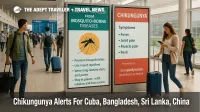
India Advisory On China Airport Transit After Detention
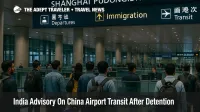
Asia Pacific Design Hotel Openings Through 2025

Asia Advisories And UAE Visit Visa Extensions
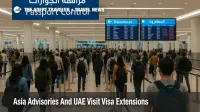
2028 World Cruise From Miami To Athens With Azamara

Hainan Tourism Rules Expand Visa Free Entry, Duty Free

China Japan Flight Cuts Hit December 2025 Travel

China Japan Flight Cuts Disrupt December Trips
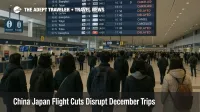
Shanghai Layover Rules Put Arunachal Travelers At Risk
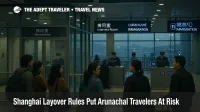
China Japan Flight Cuts Hit December Trips
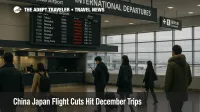
China Winter Fog Delays Flights At Major Hubs

China Japan Travel Warning Cuts Flights And Tourism
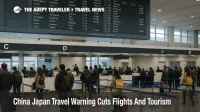
China Japan Flight Cancellations Spike November 27
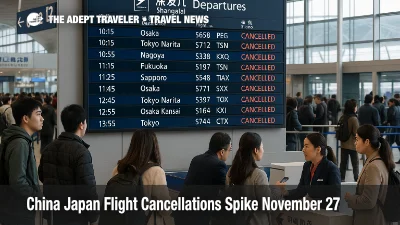
China Visa Free Transit Expands At Airports And Ports
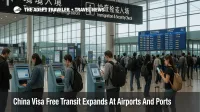
China Japan Travel Spat Deepens, Mass Flight Cancellations
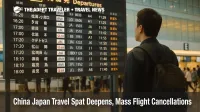
China Japan Tensions Hit Travel And Tourism
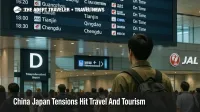
China Japan Travel Spat Cancels 491k Tickets
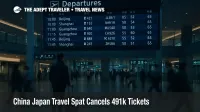
Peninsula Hotels Cyber Monday Offer For 2025

Four Seasons Unveils New World Icons Jet Journey

Celebrity Cruises Maps 2027 2028 Global Voyages

Etihad, Hong Kong Airlines Seal Codeshare, Loyalty Tie

Global Guardian Flags Geopolitics as Top Travel Risk
